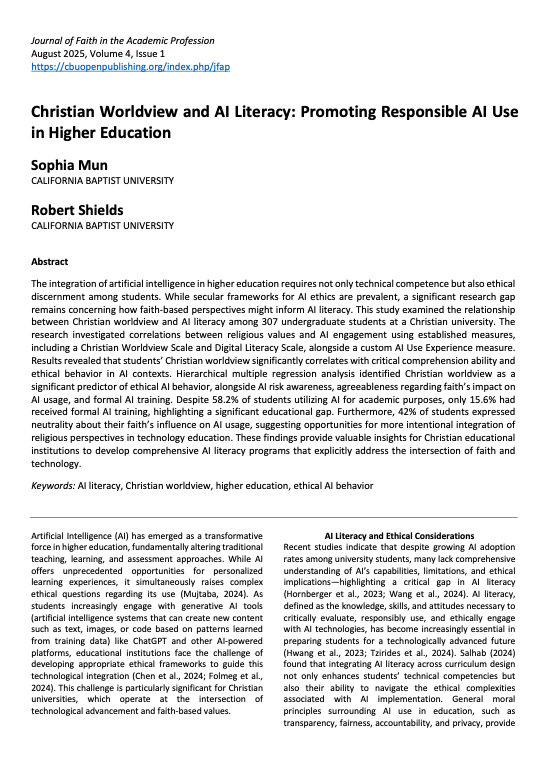Christian Worldview and AI Literacy: Promoting Responsible AI Use in Higher Education
Keywords:
AI literacy, Christian worldview, higher education, ethical AI behaviorAbstract
The integration of artificial intelligence in higher education requires not only technical competence but also ethical discernment among students. While secular frameworks for AI ethics are prevalent, there remains a significant research gap concerning how faith-based perspectives might inform AI literacy. This study examined the relationship between Christian worldview and AI literacy among 307 undergraduate students at a Christian university. Utilizing established measures, including a Christian Worldview Scale and Digital Literacy Scale, alongside a custom AI Use Experience measure, the research investigated correlations between religious values and AI engagement. Results revealed that students' Christian worldview significantly correlates with critical comprehension ability and ethical behavior in AI contexts. Hierarchical multiple regression analysis identified Christian worldview as a significant predictor of ethical AI behavior, alongside AI risk awareness, agreeableness regarding faith's impact on AI usage, and formal AI training. Despite 58.2% of students utilizing AI for academic purposes, only 15.6% had received formal AI training, highlighting a significant educational gap. Furthermore, 42% of students expressed neutrality about their faith's influence on AI usage, suggesting opportunities for more intentional integration of religious perspectives in technology education. These findings provide valuable insights for Christian educational institutions to develop comprehensive AI literacy programs that explicitly address the intersection of faith and technology.
References
Chen, K., Tallant, A. C., & Selig, I. (2024). Exploring generative AI literacy in higher education:Student adoption, interaction, evaluation and ethical perceptions. Information and Learning Sciences, 126(1/2), 132–148. https://doi.org/10.1108/ils-10-2023-0160
Feldman, U., & Cherry, C. (2024). Equipping first-year engineering students with artificial
intelligence literacy (AI-L): Implementation, assessment, and impact. In 2024 ASEE Annual Conference & Exposition Proceedings. https://doi.org/10.18260/1-2--47327
Folmeg, M., Fekete, I., & Koris, R. (2024). Towards identifying the components of students’ AI literacy: An exploratory study based on Hungarian higher education students’ perceptions. Journal of University Teaching and Learning Practice, 21 (06). https://doi.org/10.53761/wzyrwj33
Harris, D. P., & Armstrong, F. (2023). Generative AI in Adventist education: Opportunities and ethical considerations. The Journal of Adventist Education, 85(2), 4–9.
https://doi.org/10.55668/jae0043
Hornberger, M., Bewersdorff, A., & Nerdel, C. (2023). What do university students know about artificial intelligence? Development and validation of an AI literacy test. Computers and Education: Artificial Intelligence, 5, 100165. https://doi.org/10.1016/j.caeai.2023.100165
Huizinga, G. (2022). Righteous AI: The Christian voice in the ethical AI conversation (Doctoral dissertation, University of Washington). AI and Faith. http://hdl.handle.net/1773/48925
Hwang, H. S., Zhu, L. C., & Cui, Q. (2023). Development and validation of a digital literacy
scale in the artificial intelligence era for college students. KSII Transactions on Internet
and Information Systems, 17(8). https://doi.org/10.3837/tiis.2023.08.016
Knabb, J. J., Wang, K. T., Hall, M. E. L., & Vazquez, V. M. (2022). The Christian Worldview
Scale: An emic measure for assessing a comprehensive view of life within the Christian
tradition. Spirituality in Clinical Practice, 12(1), 1–19.
https://doi.org/10.1037/scp0000306
Koch, L. (2023). ChatGPT in the classroom: Uses, limitations, and student and teacher
experiences. The Journal of Adventist Education, 85(3), 4–10. https://doi.org/10.55668/jae0046
Mujtaba, B. (2024). Clarifying ethical dilemmas in sharpening students’ artificial intelligence proficiency: Dispelling myths about using AI tools in higher education. Business Ethics and Leadership, 8(2), 107–127. https://doi.org/10.61093/bel.8(2).107-127.2024
Ng, D. T. K., Leung, J. K. L., Chu, K. W. S., & Qiao, M. S. (2021). AI literacy: Definition,
teaching, evaluation and ethical issues. Proceedings of the Association for Information
Science and Technology, 58(1), 504–509. https://doi.org/10.1002/pra2.487
Salhab, R. (2024). AI literacy across curriculum design: Investigating college instructor’s
perspectives. Online Learning, 28(2). https://doi.org/10.24059/olj.v28i2.4426
Tzirides, A. O. (Olnancy), Zapata, G., Kastania, N. P., Saini, A. K., Castro, V., Ismael, S. A., You, Y., Santos, T. A. dos, Searsmith, D., O’Brien, C., Cope, B., & Kalantzis, M. (2024). Combining human and artificial intelligence for enhanced AI literacy in higher education. Computers and Education Open, 6, 100184. https://doi.org/10.1016/j.caeo.2024.100184
Usher, M., & Barak, M. (2024). Unpacking the role of AI ethics online education for science and engineering students. International Journal of STEM Education, 11(35), 1–14.
https://doi.org/10.1186/s40594-024-00493-4
Wang, C., Wang, H., Li, Y., Dai, J., Gu, X., & Yu, T. (2024). Factors influencing university
students’ behavioral intention to use generative artificial intelligence: Integrating the
theory of planned behavior and AI literacy. International Journal of Human–Computer
Interaction, 1–23. https://doi.org/10.1080/10447318.2024.2383033

Downloads
Published
Issue
Section
License
Copyright (c) 2025 Sophia Mun, Robert Shields (Author)

This work is licensed under a Creative Commons Attribution-NonCommercial-NoDerivatives 4.0 International License.


